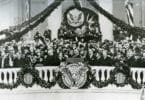Gerald Ford holds a unique place in American history as the only president who assumed office without being elected as either president or vice president. Taking on the challenge of healing a nation shaken by Watergate, Ford brought a steady hand, a strong sense of integrity, and deep personal beliefs rooted in his family and faith. This article delves into Ford’s genealogy, his spiritual values, and how these elements shaped his leadership approach and legacy.
Family Background: The Journey to Gerald Ford
Gerald Rudolph Ford Jr. was born Leslie Lynch King Jr. on July 14, 1913, in Omaha, Nebraska. His mother, Dorothy Ayer Gardner, left her first husband, Leslie Lynch King Sr., due to domestic abuse when Ford was just a few months old. She moved to Grand Rapids, Michigan, where she remarried Gerald Rudolff Ford, a local paint salesman who became the father figure in Ford’s life. When Ford was officially adopted by his stepfather, he took on the name Gerald Rudolph Ford Jr., marking a new chapter in his life.
Ford’s biological family, the Kings, had roots in the American Midwest, and his paternal ancestors were largely of English and Irish descent. Despite this heritage, Ford rarely discussed his biological father and was profoundly shaped by the values and upbringing he received from his stepfather, Gerald Rudolff Ford Sr., who instilled in him the values of hard work, integrity, and loyalty.
Ford’s mother, Dorothy, was a strong, compassionate woman who was instrumental in helping him develop a sense of self-worth and resilience. Dorothy’s courage and determination to leave an abusive marriage profoundly influenced Ford, who would carry her strength with him throughout his life.
Spiritual Beliefs and Personal Convictions
Ford’s family was devoutly Episcopalian, and his faith played a central role in his life. Attending church was a regular part of his childhood, and he maintained a quiet but firm faith throughout his career. Ford’s faith was grounded in honesty, humility, and service to others—values that reflected his religious beliefs and upbringing. Known for his straightforward and humble demeanor, Ford was often described as a man who lived his faith rather than preached it.
Ford’s spiritual beliefs emphasized forgiveness and understanding, which later became pivotal in his controversial decision to pardon Richard Nixon. Many historians suggest Ford’s faith influenced his choice, as he believed forgiving Nixon was essential to moving the country forward. Ford often spoke of his desire for the nation to heal, a sentiment deeply rooted in his belief in reconciliation and redemption.
The Influence of Sports and Discipline
Before entering politics, Ford was a standout athlete, excelling in football at the University of Michigan, where he was a star center and linebacker. His athletic achievements earned him offers to play professionally, but he chose to attend Yale Law School instead. His athletic background instilled a sense of discipline, teamwork, and perseverance that would shape his approach to life and leadership. Ford believed in the importance of fair play and hard work—values he carried into his political career.
Ford’s football experiences taught him resilience and tenacity, helping him handle the pressures of political life. His time in sports and his family’s teachings solidified his reputation as a leader who valued loyalty, dedication, and straightforwardness.
Political Career and the Unexpected Presidency
Ford’s entry into politics began in 1948 when he was elected to the U.S. House of Representatives. Representing Michigan’s 5th congressional district, Ford served in Congress for over 25 years, gaining respect as a moderate Republican who valued bipartisanship and integrity. His time in Congress reinforced his commitment to public service and belief in working across the aisle for the common good.
In 1973, amid the unfolding Watergate scandal, President Richard Nixon appointed Ford vice president following Spiro Agnew’s resignation. Less than a year later, when Nixon resigned, Ford was thrust into the presidency. His assumption of the presidency was unprecedented, making him the only U.S. president who took office without being elected president or vice president.
The Pardon of Nixon: A Decision of Faith and Principle
One of Ford’s most defining—and controversial—actions as president was his decision to pardon Richard Nixon in September 1974. Ford believed prosecuting Nixon would only prolong the country’s divisions and prevent the nation from healing. Drawing on his belief in forgiveness and his desire to prioritize the country’s welfare, Ford chose to pardon Nixon, a move that cost him politically but which he viewed as necessary for national unity.
Ford’s values and faith deeply influenced the decision. He saw the pardon as an opportunity for reconciliation, though it came at a high cost to his popularity. Many Americans viewed the pardon as a betrayal of justice, and Ford faced significant criticism for what was perceived as a political move. In later years, however, historians reevaluated the pardon as a courageous act of statesmanship, reflecting Ford’s commitment to peace and stability over personal gain.
Challenges and Achievements in Office
Ford’s presidency was brief, lasting only from 1974 to 1977, but significant challenges marked it. The country faced economic difficulties, including inflation, high unemployment, and the aftermath of the Vietnam War. Though results were mixed, Ford worked to stabilize the economy through measures such as the “Whip Inflation Now” (WIN) campaign. He also sought to rebuild public trust in the presidency by maintaining a transparent, honest administration—a sharp contrast to the secrecy of the Nixon years.
Ford’s foreign policy emphasized caution and pragmatism. He oversaw the final withdrawal of American personnel from Vietnam and sought to strengthen relations with Cold War allies. Although his time in office was limited, Ford’s leadership helped restore a measure of faith in the presidency, demonstrating the value of steady, humble governance.
Life After the Presidency and Legacy
After losing the 1976 election to Jimmy Carter, Ford retired from public life but remained active in various charitable and educational organizations. He and his wife, Betty, became advocates for health and wellness, with Betty founding the Betty Ford Center for Addiction Treatment after her own struggle with alcoholism. Ford remained an elder statesman, occasionally speaking on issues he cared about and offering advice to his successors.
Ford passed away on December 26, 2006, at the age of 93, leaving behind a legacy of integrity, humility, and service. His quiet faith and principled approach to leadership had a lasting impact on American politics, and he is remembered as a president who prioritized the nation’s well-being over personal ambition.
Legacy: A Leader Shaped by Family and Faith
Gerald Ford’s family’s teachings, faith, and commitment to integrity shaped his life and presidency. His decision to pardon Nixon was a testament to his belief in forgiveness and healing, and his steady leadership helped guide America through a turbulent time. Ford’s legacy is that of a president who, despite his challenges, remained true to his values and worked tirelessly to serve his country with humility and honesty.
Ford’s story reminds us that leadership is often defined not by ambition but by character. His life reflects the strength of his beliefs and his family’s influence, showing that a commitment to integrity and faith can guide a leader’s path even in the face of great controversy.
Learn More:
A Time to Heal: The Autobiography of Gerald R. Ford
In this personal memoir, Gerald Ford reflects on his journey from a modest upbringing to the presidency. He offers insights into his family background, personal beliefs, and the pivotal decisions during his time in office, providing a firsthand perspective on his life and leadership.
Gerald R. Ford: An Honorable Life
Authored by James Cannon, this biography delves into Ford’s character, exploring how his Midwestern roots and personal values influenced his political career. Cannon provides a comprehensive look at Ford’s integrity and the principles that guided his presidency.
Write It When I’m Gone: Remarkable Off-the-Record Conversations with Gerald R. Ford
Thomas M. DeFrank presents a collection of candid interviews with Ford, offering unique insights into his thoughts on faith, family, and politics. These conversations reveal the personal convictions that shaped Ford’s approach to leadership and his reflections on his time in office.
Gerald Ford and the Challenges of the 1970s
Yanek Mieczkowski examines Ford’s presidency within the context of the tumultuous 1970s, exploring how his personal beliefs and values influenced his responses to the era’s challenges. The book provides an in-depth analysis of Ford’s leadership during a critical period in American history.
The Presidency of Gerald R. Ford
John Robert Greene offers a scholarly assessment of Ford’s time in office, focusing on how his personal integrity and beliefs impacted his policy decisions. The book provides a balanced view of Ford’s achievements and the obstacles he faced, highlighting the role of his character in his presidency.






